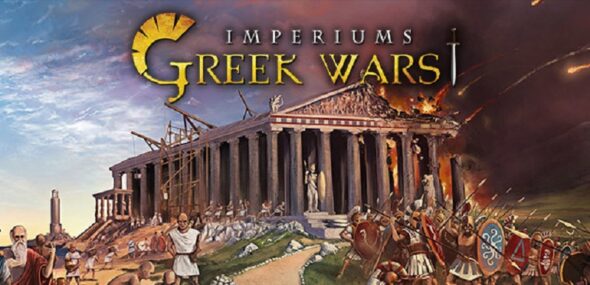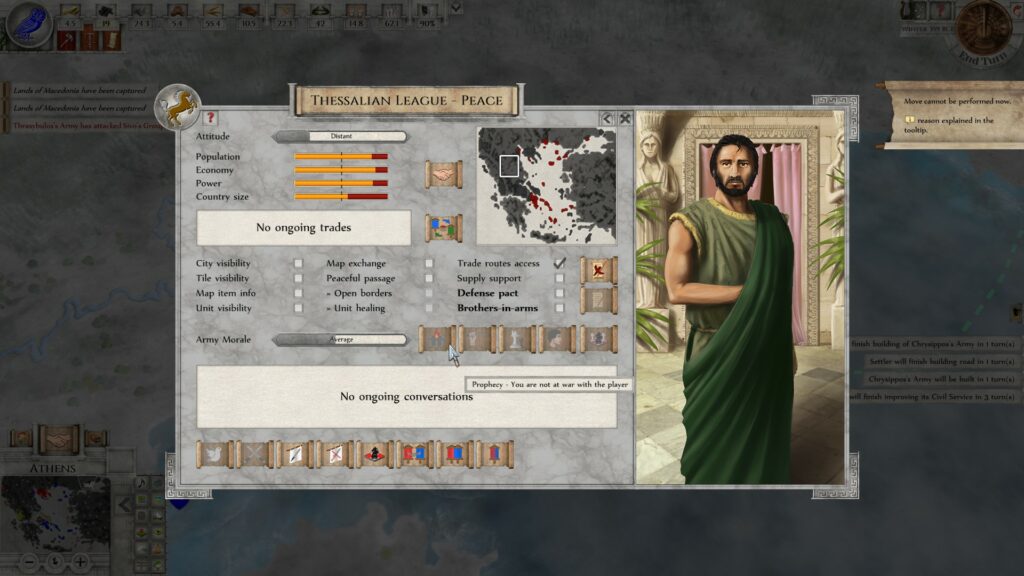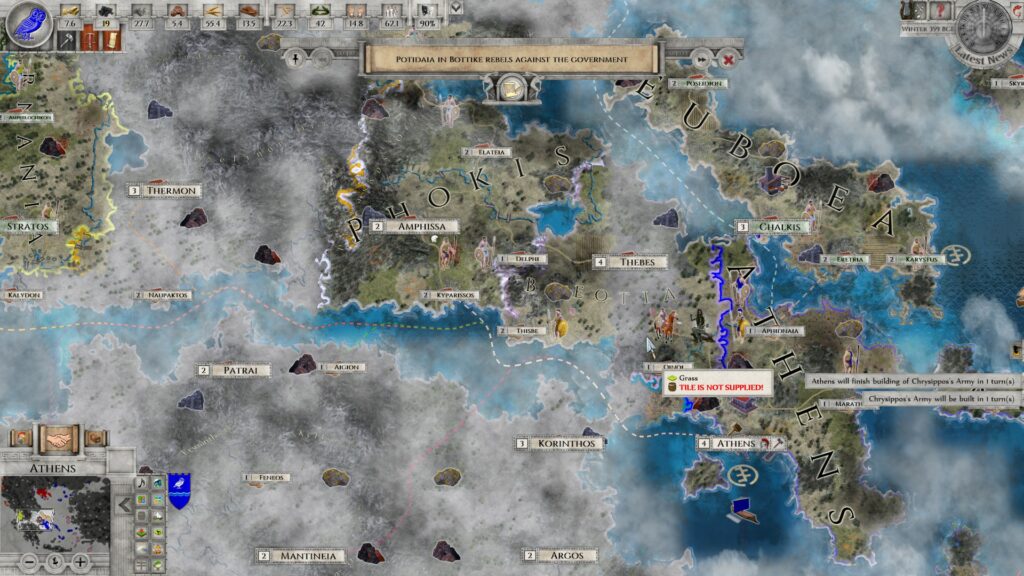
Imperiums: Greek Wars – Review
Imperiums: Greek Wars seems to be the very first game from indie developer Kube Games, and they didn’t make it easy for themselves. Developing a 4X strategy game is tough, as it is a tricky genre to dive into directly. These 4X games require a lot of minuscule details to click and a lot of intricate gameplay portions to complete the puzzle. Programming the micromanaging of bases or cities, troops, financial situations, and any form of battles is very hard. Not an easy task for your first published game indeed.
Story
Ancient Greece used to be a savage place. Wars were being waged between the (well-known thanks to the movie 300) Persians and the Greek people, as well as other races and factions. The story in the game puts you in some situational settings using those recorded battles and the history of ancient Greece. The game starts in 359 B.C. as Philip II is being crowned ruler of Macedonia. It’s a time where many factions and races are struggling to find their place, which is where you come in. You get to guide the group you picked to glory by conquering the land around you. After finishing each mission there’s more story to watch and listen to.
Deciding which faction you play as actually also sets an initial difficulty, as some factions were much larger than others. Therefore, choosing a larger faction is perceived as easier since you can use more resources compared to the small factions which still need to grow a lot. Also, if you want, you can create a custom game that has nothing to do with the story mode or the situation the story is linked to.
Graphics
While Imperiums: Greek Wars has a couple of portraits to show, way too many of them look like 300’s Leonidas character, one of them is basically a direct copy. Perhaps this is an accurate representation of the Greek era, but probably it’s more partially lazy design. Other than that, everything is made with a nice Greek visual layer. The game radiates some pre-technological era and earthy environments, which is good. The animations are a bit less but nothing to worry about. After all, this game revolves all around its strategic gameplay and not that much around graphics. You can see this back in the map and HUD which scream “strategy game”, though the HUD might be a bit confusing or overwhelming for new players due to the big load of information available.
Sound
While background tunes are missing, there are some short melodies to affirm i.e. the start of a new day. Other than that, all the sounds that are there are any that support things happening on screen. Water that’s near, a clash of two armies, you will have the basics. There is also a voice that narrates the story when available, and that plus the sound effects and the little bit of melodic support every now and then is more than enough for the game to not bore you.
Gameplay
Imperiums: Greek Wars is an overwhelming X4 strategy game. 4X stands for Explore, Expand, Exploit, and Exterminate. This means that you will take control of many aspects of the game, and in Greek Wars, this means micromanaging the hell out of your cities, the diplomatic relationships, and control over the map. So if you are looking for a smooth RTS like Age of Empires, please don’t play this. If you are into feeling like a ruler of ancient Greece where everybody seems to be fighting whenever they can, by all means, play this. If you not only like to fight but like to do the paperwork as well that is.
Even the tutorial takes quite a bit to complete, which should be sufficient for a warning for those not knowing what they are getting into. You play around with income of resources, settlers who can build stuff for you, cities you have to take over, the expertise of those cities that can produce i.e. hoplites OR other units, upgrades of the cities so they may offer more defensive capabilities, strategic choices in terms of the right terrain, building roads, and the list goes on. For a game that’s so “traditional” in the X4 strategy approach, it’s weird on the other hand that your settlers, who function as builders/workers, don’t have much to do. They only create farms and roads basically. The same goes for the cities that are more unit production facilities than real facilities to manage as you would expect from an X4 strategy game.
Much more of the game is focussed on the diplomatic aspects and moving your troops around. After all, more troops versus a single enemy troop is pretty much a guaranteed win. All the other micromanagement is just to keep these things heading in your favor. This isn’t weird since your goal is to conquer, but we are telling you this to put all the options the game offers into perspective. Eventually, it’s just another complicated game of Risk, taking over what wasn’t yours, to begin with, to win the game. The theme and the micromanagement might be the most appealing aspects for those with niche interests. The game tutorial is extensive and great as well, so even if you want to try out an X4 strategy game, this one certainly isn’t the worst to start with despite its overflow of information on the screen. Other than that, it’s a solid game but nothing too special.
Conclusion
There is not much wrong with Imperiums: Greek Wars, but there are a few noticeable points that are worth mentioning. For one, the graphics aren’t all that. For another, the game is focused a lot on the combat and the conquering for an X4 strategy game. Micromanaging the cities and possible units is simplified, and for some people, it might feel like this is the cause of something lacking.
Imperiums: Greek Wars - Review,









No Comments